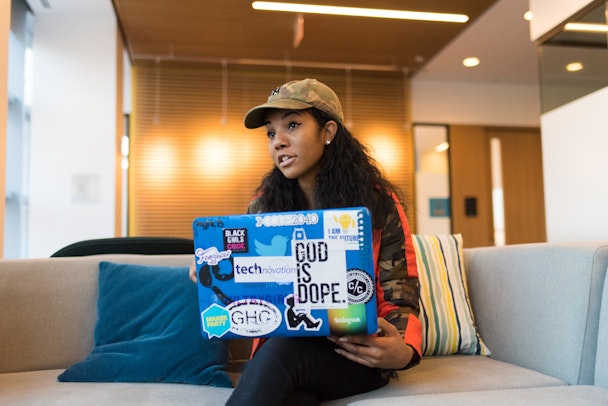Don’t let economic downturn impact your gender equity initiatives
On this year’s International Women’s day, Sidra Iqbal of agency Incubeta (whose Women’s Affinity Network she co-chairs) argues that diversity initiatives are failing the people they’re supposed to support.

On this International Women's Day, does your organization need to look again at its DE&I progress? / Christina WOCintechchat
The pandemic resulted in many behavioral and societal shifts, including around diversity in the workplace.
On the face of things, we’re moving in the right direction. Diversity is a core topic on many panels, with an equal balance of genders now a hygiene factor for many industry event organizers. More widely, a recent survey revealed that 89% of businesses have a DE&I program in place; 93% of UK marketing companies have at least one woman in a senior management role.
On this International Women’s Day (IWD), we have to ask: why are so many of these initiatives still failing?
Diversity in the downturn
Many of these initiatives have failed to prevent women, especially women of color, from being disproportionately impacted by the state of the economy. Women of color were most likely to have voluntarily or involuntarily left the workforce during the pandemic, while women have been more affected than men during the most recent round of tech layoffs.
The IPA’s agency census revealed that on average men are paid 17.4% more than women in marketing, showing that women are still bearing the brunt of the gender pay gap.
The economic climate has left women increasingly vulnerable and underrepresented. As the cost-of-living crisis bites, some digital marketing companies may be tempted to further alienate them by targeting cost-cutting at key diversity, equity, and inclusion (DE&I) initiatives. It’s even something the UK government considered doing in December.
For marketers who want to survive the economic downturn, and retain a balanced, thriving workforce, this is the wrong approach to take.
Advertisement
Best for business
Businesses that continue to thrive through the challenging economic climate will be those that don’t turn their backs on the progress they made during the pandemic. The most successful companies have diverse workforces made up of people from different genders, races, backgrounds, and ages – and that they represent neurodiversity. A study found that diverse teams outperform individuals 87% of the time, with gender-diverse teams outperforming individuals 73% of the time, compared to 58% for all-male teams.
It starts with employers
Employers have a duty to the people they employ to create an environment that is accepting and inclusive of their needs – not just for the sake of their employees, but for the sake of the future of their businesses.
The starting point – and probably the most obvious step – is ensuring that everybody is judged on an even playing field. There is no reason that women, and women of color, should be disproportionately affected by the state of the economy, other than bias.
The environment should be one where everyone has the same opportunities across the company, and where everyone is judged based on merit rather than other characteristics. Women and other minority groups can often feel as though they have to change who they are in order to progress or keep hold of their jobs. And, when they hear their jobs are more likely to be on the line, it raises doubts over whether they really belong in the organization (or the industry as a whole).
Underrepresented people should not have to deal with more hurdles being thrown in front of them. If a person is talented, their job shouldn’t be more at risk than others simply because of their demographic.
Advertisement
Taking initiative
While addressing the need to ensure that everybody is on a level playing field is extremely important, this can’t be done without the right practices and initiatives to help create that equity.
For instance, organizations should introduce independent, employee-led committees dedicated to minority groups. Sitting away from business objectives, these groups can meet regularly to come up with ideas to help make the workplace more inclusive for themselves and their peers. It’s then up to employers to be open to hearing and considering these ideas.
These groups are also in a great position to educate the wider team on the issues they face and why it’s important for them to be addressed.
Marketers should also explore flexible working – particularly to help working parents and those who care for others, but it should be open to all. This could include allowing employees to work from home at least a couple of days a week, providing the option of flexible start and finish times, or letting people work their full-time hours over fewer days.
Perhaps even more obvious, but still overlooked, is the need for diversity in senior positions. Research has found that businesses with a higher proportion of women in leadership take social responsibility more seriously, are more profitable, and deliver a higher-quality customer experience.
Suggested newsletters for you
Don’t stop progress now
The world of media and advertising has attempted to make significant strides toward becoming more inclusive. Generally, the mindset is a lot better than in the past. But there’s a long way to go, and the current economic climate is threatening to undo that progress.
Businesses need to step back and consider if their cost-cutting efforts are disproportionately affecting women and other minority groups, and do all that they can to ensure they are making their decisions based on merit alone.
A supportive, diverse workplace listens, considers the needs of all employees, and provides a level playing field. That will ensure happier staff and a more positive environment that will help create a more successful business.
Content by The Drum Network member:

Incubeta
Incubeta is a team of over 800 creators, thinkers, makers and doers working across 22 offices globally to unlock business growth for clients including Google, Hyundai,...
Find out more
